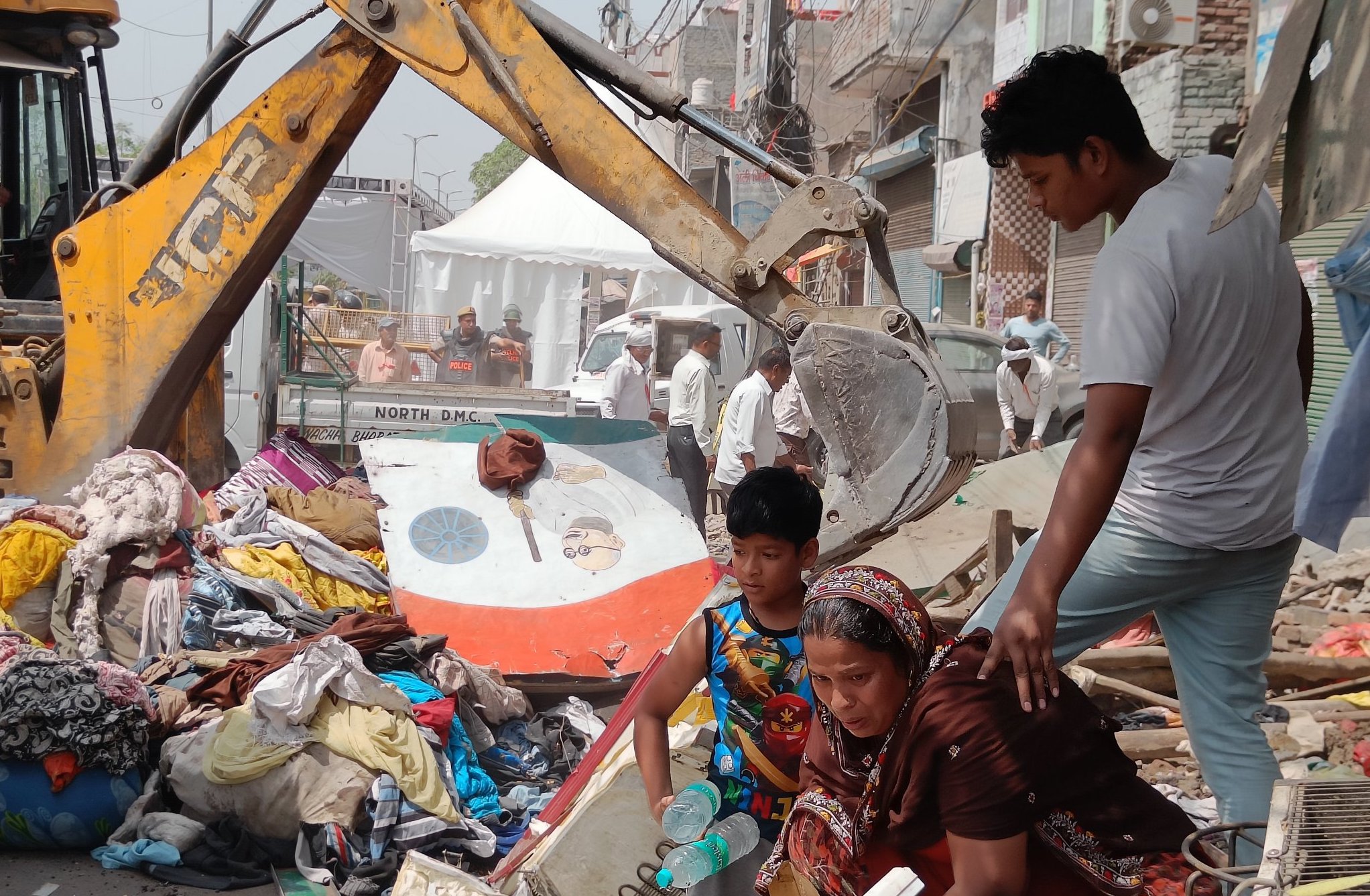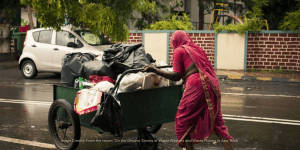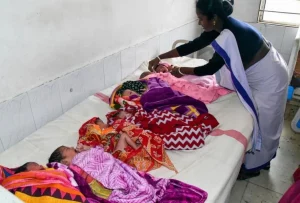How Punitive Demolition Drives Deepen The Precarity Of Muslim Women

On Monday, May 9, the South Delhi Municipal Corporation brought bulldozers and the police to Shaheen Bagh to remove “illegal encroachments”. Residents protested against the drive, maintaining that there were no illegal structures in the area and that the move was in line with earlier demolition drives targeting Muslim neigbhourhoods. Collective resistance, however, managed to stall the demolition drive.
This drive came after a recent string of similar demolition drives across India: beginning April 10, religious processions celebrating either Ram Navami or Hanuman Jayanti traversed through Muslim neighbourhoods in Khargone and Sendhwa in Madhya Pradesh, Khambhat and Himmatnagar in Gujarat, and Jahangirpuri in Delhi. Right-wing Hindu groups made hate speeches, brandished swords, and hoisted saffron flags over mosques. The resulting violence resulted in injuries and mass arrests, with Muslims impacted disproportionately.
Witnesses and victims from Khargone and Jahangirpuri claim that the police forces refused to register FIRs against Hindu miscreants. In Jahangirpuri, a Delhi Sessions Court also confirmed that the Delhi Police “accompanied the illegal procession instead of stopping it”.
In these demolition drives, homes and shops were bulldozed, with police forces injuring, brutalising and abusing residents in the process (see here and here). Even the thelas (handcarts) of street vendors that could have been simply pushed aside were targeted, eviscerating the livelihoods of some of Delhi’s most precarious urban dwellers, many of them Muslim women.
Official sanctions for such punitive demolitions have come from BJP leaders at Central, state, and municipal levels, all speaking of retribution against ‘Bangladeshis’, ‘Rohingyas’ and ‘anti-social elements’, ‘rioters’, ‘terrorists’, and ‘illegal encroachers’. In places, even the dog whistles were foregone. “If Muslims carry out such attacks, then they should not expect justice” and “whichever houses were involved in stone pelting, we will turn into piles of stones,” Madhya Pradesh home minister Narrotam Mishra had said.
Illegality and informality
The illegality of these demolition drives has been well-established. The Fundamental Right to Housing in India, as part of the Right to Life under Article 21, is not undercut by constructions being unauthorised, which most constructions in Indian cities are. For reference, 77% of Delhi’s population resides in unauthorised settlements – which are considered legitimate in various ways – as per the Delhi Economic Survey of 2008-09.
Rapid urbanisation and unclear systems of land ownership, coupled with the lack of adequate housing have created deeply unequal and heterogenous cities in India, with most built structures existing in contravention of planning guidelines. In such unplanned cities, prejudice makes room for segregated localities, as safety concerns and the exclusion of Muslims from formal housing markets create the need for “Muslim neighbourhoods”. Given the incremental, self-built nature of informal housing produced through planned illegalities, “encroachments” often have the tacit agreement of the state but are routinely subjected to demolition whenever the state hopes to use the land for other (profitable) purposes.
Deployed against the urban and semi-urban poor in the name of beautification, urban renewal, or development projects, demolition drives deny their legitimate residence and block access to resources and rights. In past demolitions too, state functionaries have garnered public “consent” by using falsehoods to prey on biases, as this study by feminist researcher and activist Kalyani Menon Sen shows. Before the BJP-led government evicted 150,000 residents of Delhi’s Yamuna Pushta settlement in 2004, it led a targeted campaign to dehumanise the residents as “illegal Bangladeshi immigrants”, “criminals and petty thieves” and “unclean”.
The law does recognise the fundamentally unplanned nature of housing, and does not condone arbitrary demolitions – relevant municipal laws across states require that reasonable notice be served before any evictions or demolitions, and that residents be given a chance to prove why their properties should be left alone. This is enshrined in the Fundamental Right to Equality (Article 14) of the Constitution.
The Supreme Court (SC) recognised in 1985 that any eviction or demolition without providing notice and the chance to be heard would be illegal. In 2010, the Delhi High Court (HC) laid down that before the state can render anybody homeless, it must conduct surveys to identify persons eligible for rehabilitation, and carry out meaningful rehabilitation of each person. The court emphasised that the Right to Housing could not be stripped for superfluous reasons, and that the surveys and subsequent plans for rehabilitation must be comprehensive. This was later upheld by the SC in 2017, and reiterated by the Delhi HC in 2019, making rehabilitation surveys an essential part of eviction exercises throughout India.
Neither requirement – of notices or rehabilitation surveys – was met in any of the present cases. In Khargone, Meer Faisal reports that a man was asleep when he heard the walls of his house being destroyed.
Punitive nature of demolitions
Illegal demolitions of informal settlements are not new, nor rare, in India as we said earlier, but what distinguishes the latest round of demolitions is the context of violence that erupted in the days leading to them and the state and district officials explicitly talking about “retribution” against the Muslim community.
In Jahangirpuri, home to Bengali Muslims and some Hindus, the people being targeted had been resettled there by the state itself in the 1970s from the banks of the Yamuna. In the saffron stronghold of Madhya Pradesh, where punitive demolitions have become the norm, reports said that even before the Ram Navami violence, properties were being routinely demolished by district authorities after criminal cases were registered against their owners – as a form of extra-judicial punishment. But it has been argued that those demolitions were selectively deployed against Muslims.
After the Ram Navami violence, at least 50 properties were razed down in Khargone, including several shops that had stood for 70 years in Talab Chowk. The aftermath saw over a hundred Muslim households displaced as they left town to avoid further state harassment.
Legislations provide remedies when demolitions or evictions are in bad faith by commanding compliance with due process. They do not, however, envision recourse for punitive or retributive actions by the state against a community. That would lie in Constitutional law, through the Fundamental Rights to Equality and Against Discrimination on the basis of religion, gender, and caste, and would have to be safeguarded by the Supreme Court and High Courts.
There is, however, no recourse if courts fail to intervene in time-sensitive matters. The SC merely stalled demolitions in Delhi, Madhya Pradesh and Gujarat for two weeks on April 21 – a limited exercise of its powers, which extend to even taking suo motu cognisance of pressing matters.
The SC dismissed a Public Interest Litigation (PIL) on April 26 to conduct a judicial inquiry into the riots across the affected cities. The bench of the Justices LN Rao and BN Gavai chided the petitioner, saying “Is anybody free?”, and “Don’t ask for relief which the court cannot grant.”
However, appointing judicial commissions, or appointing a retired judge to monitor police investigations, has been an established practice for investigating riots and communally sensitive cases. As police forces come under state governments, the presence of a retired judge acts as a check on executive power. It is for this reason that the 2002 Gujarat riots, the 1984 anti-Sikh riots, the 1969 Ahmedabad riots, and countless others, have relied on such judicial inquiries. Despite numerous appeals, neither courts nor the Delhi state government have appointed a judicial commission into the anti-Muslim pogrom in Delhi in 2020, forcing citizens to form an independent panel of retired judges and civil servants, and a people’s tribunal to probe the riots.
The MP High Court on 20 April similarly dismissed a PIL filed to investigate illegal demolitions in the state saying that the court did not see the petitioner’s locus standi (personal stake) in the matter. However, the very purpose of a PIL is to do away with the requirement of private interest, making it possible for citizens to approach the court when fundamental rights at large are at stake, particularly when they are not in a state to do so themselves – for example when they are under arrest or dealing with demolitions, or both.
Most recently, the SC dismissed a petition to stop demolitions in areas of Delhi including Shaheen Bagh, over the petitioner being a political party, again saying only affected persons should approach the court.
Gendered consequences
Muslim women stand to be the worst affected by the dispossession caused by arbitrary demolition drives. Their consequences for women – already the bearers of disproportionate political and socioeconomic vulnerabilities – are disastrous in the immediate aftermath and in terms of barriers to rehabilitation as well as long-term precarity.
Menon Sen’s study found that the most significant economic losses from demolitions are upon women’s independent incomes. Their household reproductive labour intensifies, and the loss of close-knit community networks harms day-to-day survival in innumerable ways. Women bear the brunt of destabilisation of the family or community, yet their consent in demolitions and resettlement is overruled at every step, the study said.
Examinations of demolitions in Yamuna Pushta, Khorigaon, and Kathputli Colony in Delhi, and a combined resettlement study based in Delhi, Mumbai and Chennai, all emphasise the precarious living conditions for women stemming from a lack of proper rehabilitation: the resettlement sites being uninhabitable, lacking access to services, privacy and safety, and creating food insecurity and gendered economic destitution. Those who are not able to avail resettlement face homelessness.
According to a Housing and Land Rights Network report, the health needs of displaced women, including reproductive and mental health needs, are rarely considered, compounded by poor healthcare availability at resettlement camps. Menon Sen’s study reflected that more than 75% of displaced women attending a health camp were diagnosed with reproductive tract infections; more recently, in Khorigaon, thousands of pregnant and lactating women whose homes were demolished suddenly found themselves without access to clean water and sanitation.
Beyond the generic shortfalls of resettlement schemes, Menon Sen’s study also examines how the ability to recover and rebuild is determined by one’s location: as a Muslim, as a woman, as a trader or daily wage worker, as the undocumented. As documented in the years following the Muzaffarnagar riots, disrupting the ability to rebuild is part of a particular kind of precarity experienced by those exposed to communal violence followed by state harassment. Muslim women suffer not only from being caught in the trap of informality, but also from targeted attacks on their bodies, sexualities, dignity, rights to housing, livelihoods, education, and faith.
Rehabilitation issues
It is important to situate these events in the history of the Rashtriya Swayamsevak Sangh (RSS) using religious sentiments to unleash violence. Recent reports have uncovered the Sangh Parivar’s ongoing efforts to mobilise Hindu children for violent processions. As studied by Shamsul Islam, a professor of political science at Delhi University, in the RSS scheme, the goal of the Hindu Rashtra can only be realised when Muslims are eliminated or subjugated. Muslim women are critical sites of this civilisational agenda.
The threats upon Muslim women’s bodies and bodily autonomy continue in 2022: the recent “love jihad” laws in BJP states constricting interfaith marriages, the ban on hijabs in educational institutes in Karnataka, the online mock auction of Muslim women on Bulli Bai and Sulli Bai apps, the continued threats by Hindutva extremists onto Muslim women, to list a few.
Dispossession from one’s home and livelihood has a cascading effect on all other human rights. Muslim women were hit the hardest by the targeted demolitions in Jahangirpuri where a majority of the women are rag pickers and waste-sorters, say reports. Many of the destroyed shops were built on loans they were in the process of repaying through their earnings and the demolitions pushed them into a debt spiral. Daily sustenance becomes tethered to friends and family – if they have themselves not been affected as severely – or relief efforts. Further, as many of the Muslim men have been arrested and stripped of the ability to defend themselves by arbitrary demolitions, the women are left to provide for their households, as Behanbox reported.
None of the state governments have talked about rehabilitation plans for these neighbourhoods, except for claims to recover damages from the alleged rioters (most of the men arrested are Muslim) and a claims tribunal set up by the MP government in Khargone.
Meanwhile, Hindu extremists continue to threaten Muslim livelihoods and safety in these very regions. Gujarat, where two cities have seen punitive demolition drives in the past weeks, already has a history of denying adequate housing to riot-displaced Muslim families. The aftermath of the 2020 Delhi pogrom saw heightened distress sales of property by Muslims and increased segregation in those districts, similar to what had happened after the 1992 Bombay riots and the 2002 Gujarat riots. In communally sensitive areas such as Khargone, Muslim residents have been forced to rebuild their houses over and over again after they are burnt down in riots.
Women who remain in the violence-affected areas face direct threats to their safety, and the uncertainty of the bulldozer returning. Women belonging to the families that fled their towns in anticipation of further state violence, such as in Khargone and Roorkee, face having to start over without any means of accessing rehabilitation.
If any state government does announce any form of resettlement and compensation, it would be crucial to not tie it to documents such as Aadhaar cards or address proofs that can be lost in the violence or demolitions. This would moreover disadvantage undocumented victims. If the 2020 Delhi pogrom is any indication of compensation being given out, such compensation must be independent from registering police complaints, for the various barriers in filing such complaints.
We believe everyone deserves equal access to accurate news. Support from our readers enables us to keep our journalism open and free for everyone, all over the world.




